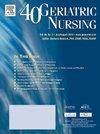Adherence and satisfaction with interventions and neuropsychological changes in older people: A randomized clinical trial
IF 2.5
3区 医学
Q3 GERIATRICS & GERONTOLOGY
引用次数: 0
Abstract
Purpose
To assess the impacts of adherence and satisfaction with interventions on changes in neuropsychological risk factors for falls in older adults with a history of falls.
Methods
This controlled, randomized, single-center clinical trial was conducted with Brazilian community-dwelling older adults with a history of at least 2 falls in the past 12 months. Participants were divided into two groups: the Intervention Group (IG) and the Control Group (CG), with assessments at baseline and after 16 weeks. The IG participated in a case management program, including a multidimensional assessment, an explanation of fall risk factors, an individualized intervention plan, and monitoring. The CG received monthly health-related guidance. Evaluations included clinical and sociodemographic data, neuropsychological measures (cognition, depressive and anxiety symptoms, fear of falling), adherence to intervention and satisfaction with interventions.
Results
The final sample consisted of 26 volunteers from the CG and 29 volunteers from the IG. The mean frequency in the IG (adherence) was 80.27 %. There was good satisfaction in both groups, especially in the IG. Both groups showed a non-significant increase in global cognitive functions, especially the IG. Adherence to the case management-based intervention and satisfaction with remote interventions did not positively influence neuropsychological changes over 16 weeks.
Conclusion
Despite individuals' adherence and satisfaction with the interventions being positive, these factors did not influence changes in neuropsychological risk factors for falls in older people with a history of recurrent falls in the past 12 months.
老年人对干预措施的依从性和满意度与神经心理变化:一项随机临床试验
目的评估干预依从性和满意度对有跌倒史的老年人跌倒神经心理危险因素变化的影响。方法:这项对照、随机、单中心临床试验在过去12个月内至少有2次跌倒史的巴西社区老年人中进行。参与者被分为两组:干预组(IG)和对照组(CG),分别在基线和16周后进行评估。监察长参与了一项病例管理计划,包括多维评估、跌倒风险因素解释、个性化干预计划和监测。委员会每月接受与健康有关的指导。评估包括临床和社会人口学数据、神经心理学测量(认知、抑郁和焦虑症状、害怕跌倒)、对干预措施的依从性和对干预措施的满意度。结果最终样本由CG组26名志愿者和IG组29名志愿者组成。IG(依从性)的平均频率为80.27%。两组患者满意度均较高,尤其是IG组。两组患者的整体认知功能,尤其是IG均无显著性提高。坚持以病例管理为基础的干预和对远程干预的满意度在16周内对神经心理变化没有积极影响。结论尽管个体对干预措施的依从性和满意度是积极的,但这些因素并不影响过去12个月内有复发跌倒史的老年人跌倒的神经心理危险因素的变化。
本文章由计算机程序翻译,如有差异,请以英文原文为准。
求助全文
约1分钟内获得全文
求助全文
来源期刊

Geriatric Nursing
医学-护理
CiteScore
3.80
自引率
7.40%
发文量
257
审稿时长
>12 weeks
期刊介绍:
Geriatric Nursing is a comprehensive source for clinical information and management advice relating to the care of older adults. The journal''s peer-reviewed articles report the latest developments in the management of acute and chronic disorders and provide practical advice on care of older adults across the long term continuum. Geriatric Nursing addresses current issues related to drugs, advance directives, staff development and management, legal issues, client and caregiver education, infection control, and other topics. The journal is written specifically for nurses and nurse practitioners who work with older adults in any care setting.
 求助内容:
求助内容: 应助结果提醒方式:
应助结果提醒方式:


